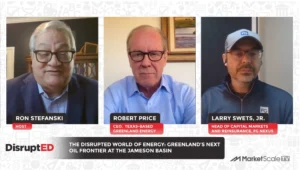Can Public Transit Support Local and Federal Climate Plans?
The march toward cleaner cities continues at the local and federal level – but there are many roadblocks still ahead.
Key questions surround the role of public transit in the overall effort to lessen the environmental impact of the ways in which we get around. Can public transportation do its part to support climate-friendly strategies? And more importantly, will local governments maximize public transit for their goals, or leave it behind?
To discuss, Voice of B2B Daniel Litwin invited railway engineer and writer Gareth Dennis onto this episode of MarketScale TV.
The conversation surrounding this issue has heightened with the news that Massachusetts has invested in expanding the sale of electric vehicles as part of its push for cleaner transportation as opposed to encouraging more public transit use or overhauling public transportation options.
So, does that mean more cities and regions will follow suit? Where do public transit use and evolution fall in the quest for cleaner transportation options? The duo discussed.
“Electric personal vehicles, private vehicles, represent quite a sizable change in vehicle operation,” Dennis said. “The [electrical] infrastructure might not be there to support that shift from fossil fuel-burning vehicles with internal combustion engines to electric vehicles. There are some challenges, there.
“Both electric vehicles and public transport require physical infrastructure changes. … The wider picture is whether it’s a good idea for personal, private electric vehicles to be the way forward.”
Follow us on social media for the latest updates in B2B!
Twitter – @MarketScale
Facebook – facebook.com/marketscale
LinkedIn – linkedin.com/company/marketscale








